

We are the first startup to propose a new ISO standard
An international ISO standard for assessment of maritime energy efficiency
A standard towards a greener future
ReFlow has partnered up with Dansk Standard, Danske Maritime, and Danske Rederier on creating a new ISO standard for Maritime Energy Efficiency. The work is set to take 3,5 years and was launched in November 2020. The project will involve more than 60 nations and take over three years to create a tool for ship owners and maritime manufacturers to build a new generation of environmentally friendly ships. Den Danske Maritime Fond funds the project.
Good news – the project has been approved by ISO its member countries and the global work has now started.

Project Name:
Maritime Energy Efficiency Standard
Initiated:
November 2020
Collaboration between:
ReFlow, Dansk Standard, Danske Maritime
Supported by:





Sailing Towards Zero – a greener and circular future
The project showed a decrease in carbon emissions when engaging maritime components in circular maintenance, compared to the traditional linear model.
The project anticipates resulting in a generic framework for calculating CO2 while bringing forth recommendations to implementing the principles of circular economy and maintenance.
Project Name:
Project Sailing Towards Zero
Founded by:
The Danish Maritime Fund
Project Lead:
ReFlow
Time Horizon:
Mid-January to End-June 2020
Supported by:
CBS – Copenhagen Business School, Chris Marine, Danish Maritime, Danish Shipping, D/S Norden, IRON Pump, Maritime Development Center, Marine Fluid Technology, PJ Diesel Engineering, Port Safety, Renotronic, Scandlines, Unifeeder
Mentioned in the media:
Søfart
Background
The implementation of a circular economy in the maritime industry has begun to gain momentum. Several maritime manufacturers see SDG 12 “Responsible production and consumption” as a sustainable supplement to the already existing productions. There are often situations where shipping companies demand components of older designs that are no longer stocked for financial reasons. In this case, components of a circular flow can advantageously be implemented by the individual manufacturer. The benefits include the obvious environmental savings, as well as a faster delivery time – as it often requires fewer resources to renovate a component than it takes to produce a new unit. In the case where a manufacturer is unable to supply a given component within the requested time, studies show that in many cases users are looking for alternative suppliers abroad. Implementation of a circular flow can, therefore, help to ensure delivery security, which will be advantageous for the Danish suppliers and shipping companies.
Area of problem
Components that are maintained in a circular flow will, over time, have a lower comparable CO2 footprint compared to buying newly manufactured components. However, there is currently no model or framework for calculating the CO2 load for maritime components in a circular flow. No current study has yet endeavored into creating an industry generic framework due to the complexity and the variety of vessel types and maritime components. We also discovered that current studies have faced the issues of lack of transparency in the industry, and therefore lack of access to data.
The project
The project aims to investigate various maritime components to provide a representative sample of remanufacturing potentials, which will serve as the basis for which areas of analysis should be prioritized in a CO2 calculation. We rely on data from our stakeholders to provide an overview of components in ship structures, the estimated materials, estimated individual weights and maintenance scenarios in the lifespan of various types of vessels.
The project uses the Life-Cycle Assessment software-tools SimaPro and Ecoinvent to provide the most accurate estimate of the environmental footprint on materials and their individual energy consumptions, to be able to trace the environmental impact of scope 1, 2 and 3 emissions.
This project aims to represent the broader maritime industry, as due to the complicated nature of using engineer-to-order in ship builds, the anticipated result will be to create a framework that will serve to calculate emissions based on weight principals.
This means the framework can be used on various sized vessels and their individual components as long as the user of the framework can provide estimated weight and estimated consisting materials.
As a contribution to the International Maritime Organizations strategy of seeking to halve the sector’s carbon emission by 2050, the framework will put core focus on carbon emissions in relation to production, often mentioned as scope 3 emissions. The framework will provide a level of decrease in carbon emissions when remanufacturing compared to buying new components.
The project is also a direct response to the Sustainable Development Goal 12: Sustainable Production and Consumption, as we explore the sustainable advantages of introducing a circular economy and remanufacturing in the production of maritime components.
Anticipated results
The project is intended to be carried out as a non-profit project for the benefit of the Danish maritime industry. This means that framework and recommendations are published to strengthen and harmonize the Danish maritime producers’ sustainability efforts. This quantitative result can thus be used by Danish shipping companies to document the given sustainability efforts, as well as a reduction in CO2 emissions. While providing Danish Component Manufactures recommendations to engaging in the circular economy.
Funding
The Danish Maritime Fund is funding Project Sailing Towards Zero, and cover consultancy, project management, auditing, LCA software and database licenses, and report preparation.
Our project partners:

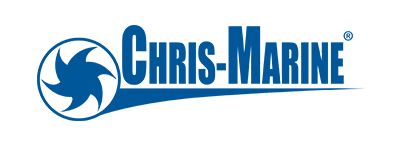
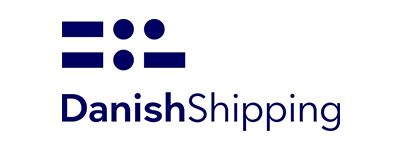

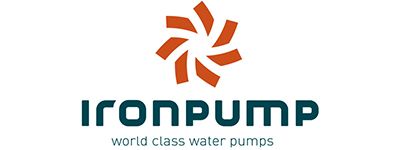

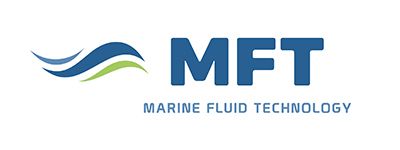

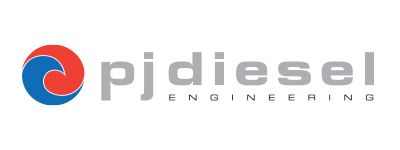

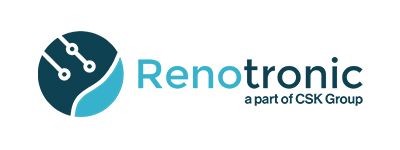


MARITIME CARBON FOOTPRINT CALCULATOR
Lower your carbon footprint
Discover how circular maintenance has the potential to lower your maritime component’s carbon footprint with up to 90%.
It’s time to think circular!
The Carbon Footprint Calculator is an industry-first tool to create awareness of the extensive environmental impact reduction potential circular maintenance brings. The calculator can estimate the ecological savings from circular activities like remanufacturing. The calculator combines data from over 400+ data sets of environmental assessments of maritime components. The tool is free to use, and its development has received support from The Danish Maritime Fund.
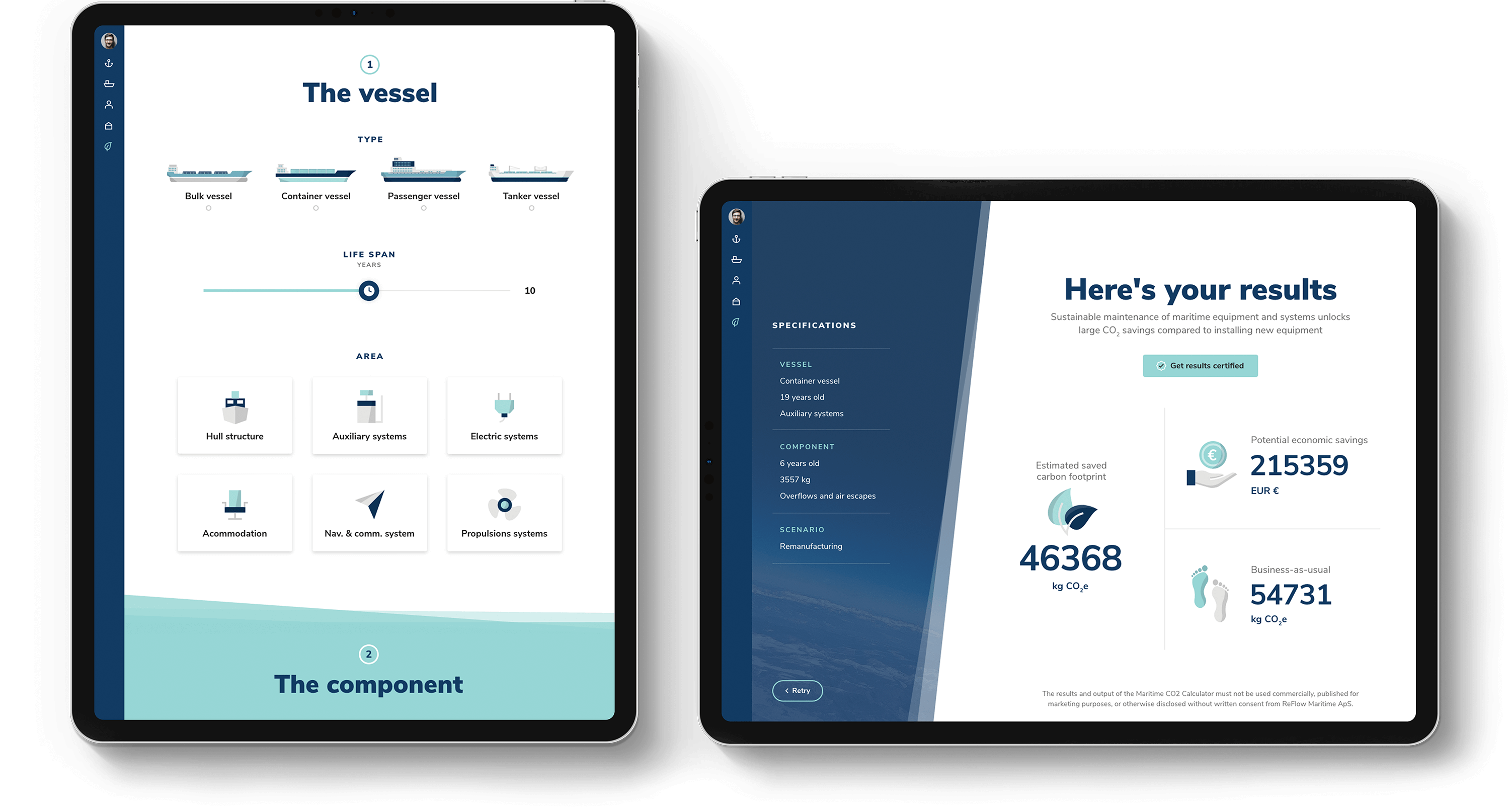
Watch Intro
Project Name:
The Carbon Footprint Calculator
Release:
November 2020
Put forward by:
ReFlow
Supported by:
The Danish Maritime Fund
Our Partners
Our lifecycle-based environmental quantification system makes it easy to calculate, document, and share environmental performance data of products. We remove the complexity around LCA-based calculations and make it possible for users with just basic product knowledge to make advanced calculations.
ReFlow ApS
Bryggervangen 55, 1. th.
2100 København Ø
Denmark
CVR: 39843870
Mail: info@re-flow.io
Tel: +45 3274 5300
© ReFlow ApS 2022 – All rights reserved
